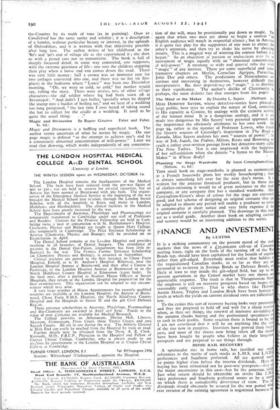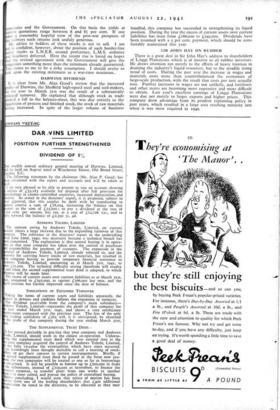FINANCE AND INVESTMENT
By CUSTOS
IT is a striking commentary on the present mood of the stock markets that the news of a 435,000,000 call-up of Canadian sterling loans, right on the heels of the turning off of the War Bonds tap, should have been capitalised for the benefit of equitia rather than gilt-edged. Everybody must realise that holders d the requisitioned Canadian stocks, in so far as they are not persuaded to re-invest in Savings Bonds or Defence Bonds, are likely at least to stay inside the gilt-edged field, but up to the present quotations in the Consol market have not shown any appreciable response. The truth is that in Throgmorton Street the emphasis is still on recovery prospects based on hopes of reasonably early victory. That is why shares like Harrods Austin Motor, Triplex and London Brick have been hoisted to levels at which the yields on current dividend rates are ridiculously low.
To the cynics this sort of recovery buying looks very premature, and they are prepared to hold off and wait for a sharp reactio: when, as they see things, the renewal of intensive air-raiding 1h the autumn checks buying and the professional speculators 15 to cash in their profits. Some reaction there is bound to be, hu: I am not convinced that it will be on anything like the so] of the rise now in progress. Investors have proved their tough. ness, and most of the shares now being taken off the mar have been bought by people who believe in their long-t prospects and are prepared to see things through.
HOME RAIL RECOVERY
A spectacular rise in home rails, has justified my reC references to the merits of such stocks as L.M.S. and L.N.E preferences and Southern preferred. All are quoted near to points higher than before the interim dividends. Here I buying has been stimulated not by post-war-prospects—they the major uncertainty in this case—but by the generous yiel Just what return should be obtainable on stocks like L.M. 1923 preference and Southern preferred seems to be a ma on which there is considerable divergence of view. The dividends should obviously be assured for the war period W ever revision of the existing agreement is negotiated between parties and the Government. On this basis the yields at rrent quotations range between 8 and 81 per cent. If one s a reasonably hopeful view of the post-war prospects of e railways such returns look unduly generous.
My advice to holders of these stocks is not to sell. I am of so confident, however, about the position of such border-line for stocks as L.N.E.R. second preference, L.M.S. ordinary d Southern deferred. Here the recent rise is based on hopes at the revised agreement with the Government will give the inpanies something more than the minimum already guaranteed.- his seems to me to be a risky assumption. I should prefer to ook upon the existing minimum as a war-time maximun..
DARWINS DIVIDEND
It is clear from Mr. Alan Good's review that the increased rofits of Darivins, the Sheffield high-speid steel and tool-makers, or the year to March 31st was the result of a substantially nlarged turnover. He explained that although stock in trade howed a fall in the balance-sheet, this was due entirely to the quidation of process and finished stock, the stock of raw materials aving increased. In spite of the larger volume of business
handled, this company has succeeded in strengthening its liquid position. During the year the excess of current assets over current liabilities has risen from £166,000 to £245,000. Dividends have been resumed with a 5 per cent. payment, which should be com- fortably maintained this year.
SIR JOHN HAY ON RUBBER
There is a great deal in Sir John Hay's address to shareholders of Linggi Plantations which is of interest to all rubber investors. He draws attention not merely to the effects of heavy taxation in draining the industry's liquid resources, but to the steadily rising trend of costs. During the past year the increase in wages and materials costs more than counterbalanced the economies of large-scale production, with the result that costs per unit actually rose. Further increases in wages are not unlikely, and fertilisers and other stores are becoming more expensive and more difficult to obtain. Last year's excellent earnings of Linggi Plantations were due not merely to larger exports and higher prices. This company drew advantage from its prudent replanting policy in past years, which resulted in a large area reaching maturity just when it was most required in 1940.



























 Previous page
Previous page